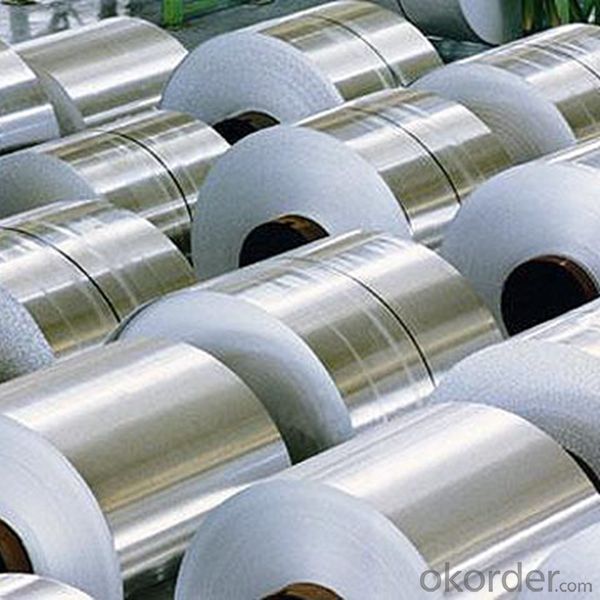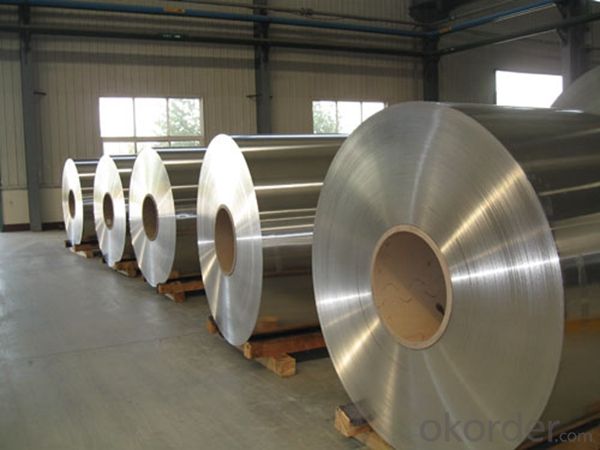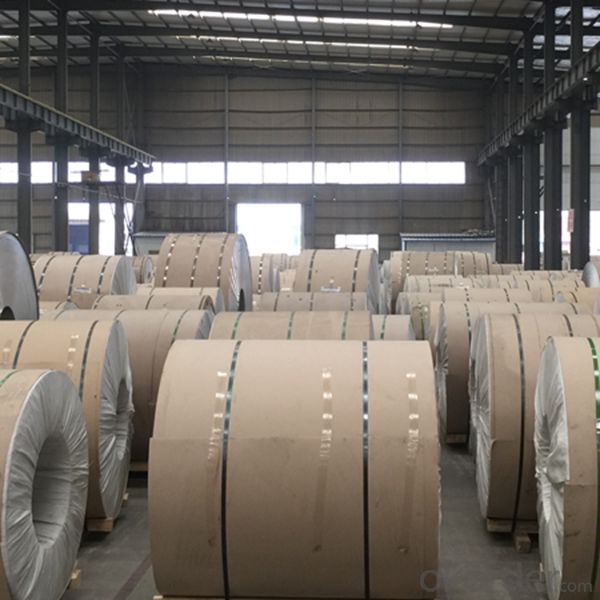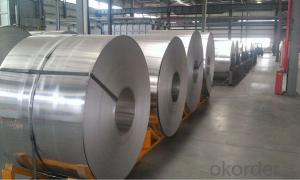Hot Rolled Aluminium Coil 5005H14 for Automotive
- Loading Port:
- Shanghai
- Payment Terms:
- TT OR LC
- Min Order Qty:
- 5 m.t.
- Supply Capability:
- 10000 m.t./month
OKorder Service Pledge
OKorder Financial Service
You Might Also Like
Item specifice
1. Specification of Hot Rolled Aluminium Coil 5005H14 for Automotive
Name | Aluminum Coil |
Brand | CNBM |
Alloy | 1100H-18, 3003-H24,3003-H26,3005-H26,8011,3004,3105,5005,etc. |
Thickness | 0.1~1.5mm |
Width | <2000mm< span=""> |
MOQ | 1 MT |
Coating finish | Brushed, drawing, embossed, printing |
Color | As to code RAL |
Surface | Embossed,Mill Finish,Coated,Brushed |
Gloss | 10-90%(EN ISO-2813:1994) |
Total coating thick | PVDF27 ~35micron |
Polyester18~27micron(EN ISO-2360:1995) | |
Coating hardness | 2H |
Adhesion | 5B (EN ISO-2409:1994) |
Impact resistance | No cracking and peeling (A.S.T.M D2794-1993) |
Flexibility (T-bend) | 0T- 2T |
MEK resistance | 100 |
Certification | ISO9001:2000, CE, SGS |
Coil's standard diameter | 1100mm |
Inner Diameter | 405mm/505mm |
Coil's standard weight | 1MT - 2MT |
2. Application of Hot Rolled Aluminium Coil 5005H14 for Automotive
(1).Interior: wall cladding, ceilings, bathrooms, kitchens and balconies, shutters, doors...
(2).Exterior: wall cladding, facades, roofing, canopies, tunnels,column covers , renovations...
(3).Advertisement: display platforms, signboards, fascia, shop fronts...
3. Feature of Hot Rolled Aluminium Coil 5005H14 for Automotive
*Such coil is specially designed to replace aluminum ingot, due to the high export tax of aluminum ingot, the coil has better price than ingot.
*This type of coil can fit customer's remelting furnace just like ingot, no need to make any change to the production line that was previously used for ingot. The standard coil size and weight is very suitable for the feed gate of furnace.
*This type of coil causes less material wastage than ingot when remelted.
*Our coil is made directly from ore, no need to go though the ingot making process, quality is much better than other suppliers who use ingot scrap to make coil.
Be free from Oil Stain, Dent, Inclusion, Scratches, Stain, Oxide Dicoloration, Breaks, Corrosion, Roll Marks, Dirt Streaks and other defect which will interfere with use
4. Certificate:
SGS and ROHS(if client request, paid by client), MTC(plant provided), Certificate of Origin(FORM A, FORM E, CO), Bureau Veritas and SGS (if client request, paid by client), CIQS certificate
5. Image of Hot Rolled Aluminium Coil 5005H14 for Automotive



6. Package and shipping of Hot Rolled Aluminium Coil 5005H14 for Automotive
eye to wall
eye to the wall
with wood pallet (wooded case also available)
7. FAQ
1) What is the delivery time?
Dpends on actual order, around 20 to 35 days
2)What is the QC system:
We have QC staff of 20 persons and advanced equipment, each production is with MTC traced from Aluminum ingot lot.
3) What market do you mainly sell to?
Australia, America, Asia, Middle East, Western Europe, Africa etc
- Q:What is the maximum operating temperature for aluminum coils?
- The specific grade of aluminum used typically determines the maximum operating temperature for aluminum coils. Generally, aluminum has a high melting point of approximately 660 degrees Celsius (1220 degrees Fahrenheit), allowing it to endure high temperatures without melting or distorting. For common grades of aluminum, the maximum operating temperature usually ranges from 200 to 300 degrees Celsius (392 to 572 degrees Fahrenheit). However, it is important to consider factors like coil thickness and the intended application, as these can affect the temperature range. In instances where higher temperatures are anticipated, it is advisable to employ aluminum alloys specifically engineered to withstand such conditions. Aluminum alloy 6061, for example, can tolerate maximum operating temperatures of up to 400 degrees Celsius (752 degrees Fahrenheit) or even higher. To guarantee safe operation within temperature limits, it is always recommended to consult the manufacturer's specifications and guidelines for the specific aluminum coils being utilized.
- Q:How do aluminum coils contribute to thermal management?
- Aluminum coils play a crucial role in thermal management due to their excellent heat transfer capabilities. Aluminum has a high thermal conductivity, which means it can efficiently transfer heat from one area to another. This property is essential in various applications that require effective thermal management, such as air conditioning systems, refrigeration units, and heat exchangers. In air conditioning systems, aluminum coils are commonly used in the condenser and evaporator coils. The condenser coil dissipates heat from the refrigerant to the surrounding air, while the evaporator coil absorbs heat from the indoor air to cool it down. The high thermal conductivity of aluminum allows for efficient heat transfer between the refrigerant and the surrounding air, resulting in faster and more effective cooling. Similarly, in refrigeration units, aluminum coils are utilized in the evaporator coils to remove heat from the interior space. The aluminum coils help to extract heat from the refrigerated area and transfer it to the outside environment, maintaining a lower temperature inside the unit. Aluminum coils also find application in heat exchangers, which are used in a wide range of industries, including automotive, power generation, and HVAC. Heat exchangers are devices that transfer heat between two or more fluids, often with different temperatures. The high thermal conductivity of aluminum enables efficient heat exchange between the fluids, improving overall system performance and energy efficiency. Moreover, aluminum coils are lightweight and resistant to corrosion, making them highly durable and suitable for long-term use in harsh environments. These properties further enhance their contribution to thermal management by ensuring reliable heat transfer and reducing the risk of system failure or efficiency loss. In summary, aluminum coils are instrumental in thermal management systems as they facilitate efficient heat transfer, contribute to faster cooling or heating processes, and enhance overall system performance. Their high thermal conductivity, lightweight nature, and corrosion resistance make them a preferred choice in various applications where effective thermal management is essential.
- Q:What is a better deal?Aluminum Cookware ( Paula Deen)orHard Anodized ( Rachael Ray )
- Wow, Thank you! Exactly what I was searching for. I looked for the answer on other websites but I couldn't find them.
- Q:Can aluminum coils be used in food storage facilities?
- Yes, aluminum coils can be used in food storage facilities. Aluminum is a safe and commonly used material for food storage due to its non-reactive properties and resistance to corrosion, making it suitable for maintaining food quality and preventing contamination.
- Q:How are aluminum coils used in the production of cans and containers?
- Aluminum coils are used in the production of cans and containers as they are rolled into thin sheets that can be shaped into the desired form. These coils are fed into a machine where they are cut, formed, and joined together to create the body of the can or container. The lightweight and corrosion-resistant properties of aluminum make it an ideal material for packaging, ensuring the preservation and protection of the contents inside.
- Q:I need to write as many interesting facts as i can about aluminum for a thing for school, any help?
- indexed here are some exciting generally non exciting info related to the factor Al, its is a metalloid, a comparatively severe density, malleable, that is drawn into twine, stable conductors of electric energy, can mirror warmth and gentle-weight, remains a stable room temperature (25 levels celsius), does not comfortably combine with different metalloids yet combines with non metals. exciting fact a steel and a non steel have the applications to create a salt. Al. guard homes of the two steel and non-steel homes. such homes of non metals are comfortable and fragile, low melthing factors, combine with metals,undesirable conductors for warmth and electrical energy, have little luster and have low melting factors.
- Q:Can aluminum coils be used in food storage facilities?
- Yes, aluminum coils can be used in food storage facilities. Aluminum is a widely used material in the food industry due to its excellent properties such as its lightweight, durability, corrosion resistance, and heat conductivity. These qualities make aluminum coils suitable for various applications in food storage facilities. Aluminum coils can be utilized in refrigeration systems, air conditioning units, and food storage cabinets, among others. Additionally, aluminum is non-toxic and does not react with food or alter its taste, making it a safe option for food storage. However, it is important to ensure that the aluminum coils used in food storage facilities are properly cleaned and maintained to prevent any potential contamination.
- Q:How are aluminum coils used in the production of electrical conductors?
- Aluminum coils are used in the production of electrical conductors as they provide a lightweight and cost-effective alternative to copper coils. The coils are typically wound around a core to create a magnetic field when electricity passes through them, allowing for the efficient transmission of electrical energy. Aluminum's high conductivity and low resistance make it an ideal choice for manufacturing electrical conductors, resulting in improved energy efficiency and reduced production costs.
- Q:How do aluminum coils contribute to architectural design flexibility?
- Architectural design flexibility is greatly enhanced by the unique properties and versatility of aluminum coils. Firstly, their lightweight nature simplifies handling and installation, in contrast to materials like steel or concrete. This attribute grants architects the freedom to explore more imaginative and innovative designs, unburdened by weight constraints. It also facilitates the construction of large and intricate structures, providing architects with greater design freedom. Secondly, aluminum coils offer an extensive array of surface finishes and colors. They can be painted, anodized, or coated with various materials, enabling architects to achieve desired aesthetic effects and harmonize the building's appearance with its surroundings or intended architectural style. This broad range of finishes allows architects to experiment with diverse visual effects, textures, and patterns, thereby enhancing overall design flexibility. Furthermore, aluminum coils possess exceptional corrosion resistance properties. This durability ensures that architectural elements made from aluminum coils can withstand harsh weather conditions, such as rain, snow, or UV radiation, without deteriorating over time. The extended lifespan and minimal maintenance requirements of aluminum coils make them an appealing choice for architects seeking sustainable and long-lasting design solutions. Moreover, aluminum coils can be easily shaped, bent, or formed into an assortment of profiles and dimensions. This malleability empowers architects to create custom architectural elements that meet specific design requirements, such as curved facades, intricate detailing, or irregular shapes. The ability to mold aluminum coils according to the architect's vision enables the realization of distinctive and unique designs that stand out in the architectural landscape. Lastly, aluminum coils are recyclable and environmentally friendly. By incorporating aluminum into architectural design, architects align themselves with sustainable practices, as aluminum can be recycled repeatedly without losing its properties. This aspect appeals to architects and clients who prioritize eco-friendly design solutions and seek to minimize their carbon footprint. In conclusion, aluminum coils significantly contribute to architectural design flexibility by offering lightweight construction, a wide range of surface finishes, excellent corrosion resistance, malleability, and recyclability. These characteristics empower architects to push the boundaries of design, create visually stunning structures, and deliver sustainable and enduring architectural solutions.
- Q:i have a project that requires me to know how safeway aluminum foil is made. i researched it on the internet, and also called safeway for it. they never gave me an answer. same for the diamond aluminum foil.please help!!!!i just need to know where they make it, how thick it is, and/or information about the ingots (such as size)and also temp. of heating room
- I'd okorder /... and they have some things on sheet as well. Something that neither covers is the lamination process, wherein the aluminum foil is coated with an organic layer (a really thin layer of plastic) to keep the metallic taste out of the food that it contacts. I believe that different companies have different ways of applying the coatings, but I'd bet they're all some variant of dip, brush, or spray followed by a heat cure. Good luck on your project!
1. Manufacturer Overview |
|
|---|---|
| Location | |
| Year Established | |
| Annual Output Value | |
| Main Markets | |
| Company Certifications | |
2. Manufacturer Certificates |
|
|---|---|
| a) Certification Name | |
| Range | |
| Reference | |
| Validity Period | |
3. Manufacturer Capability |
|
|---|---|
| a)Trade Capacity | |
| Nearest Port | |
| Export Percentage | |
| No.of Employees in Trade Department | |
| Language Spoken: | |
| b)Factory Information | |
| Factory Size: | |
| No. of Production Lines | |
| Contract Manufacturing | |
| Product Price Range | |
Send your message to us
Hot Rolled Aluminium Coil 5005H14 for Automotive
- Loading Port:
- Shanghai
- Payment Terms:
- TT OR LC
- Min Order Qty:
- 5 m.t.
- Supply Capability:
- 10000 m.t./month
OKorder Service Pledge
OKorder Financial Service
Similar products
New products
Hot products
Related keywords




























